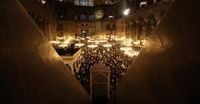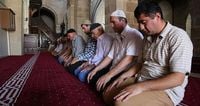Millions of Muslims across Turkey will gather in mosques to perform the Eid al-Fitr prayer on March 30, 2025, marking the end of Ramadan. This significant event symbolizes unity and joy within the Islamic community, as people come together to celebrate the conclusion of a month of fasting and reflection.
In Kars, the Eid prayer is scheduled to take place at 06:26 AM. This timing is part of a broader national schedule released by the Turkish Presidency of Religious Affairs, which outlines prayer times in various cities. For instance, in Ankara, the prayer will commence at 07:07 AM, while in Istanbul, it will be at 07:22 AM, and in Izmir, the prayer is set for 07:30 AM.
The Eid prayer, or bayram namazı, is traditionally performed approximately 50 minutes after sunrise. It is a special prayer that consists of two units (rakats) and is distinct from the regular daily prayers. The performance of this prayer is considered obligatory in the Hanafi school of thought and recommended in others.
As millions prepare for the prayer, many are eager to understand how to properly perform the Eid prayer. The process begins with the intention, or niyyah, where the worshipper silently declares their intention to pray. For example, one might say, "I intend to pray the Eid al-Fitr prayer for Your pleasure, O Allah, and I follow the imam present."
Following the niyyah, the imam leads the congregation in the prayer. The first unit begins with the imam saying "Allahu Akbar" (God is the Greatest), while the congregation responds quietly with the same phrase, raising their hands to their ears and then letting them fall at their sides. After this initial takbir (the act of saying "Allahu Akbar"), the congregation recites the Surah Al-Fatiha, followed by another chapter from the Quran.
After completing the recitation, the imam leads the congregation into the bowing position (ruku), where three times they say, "Subhana Rabbiyal Azim" (Glory is to my Lord, the Most Great). The congregation then rises, saying, "Sami' Allahu liman Hamidah" (Allah hears the one who praises Him). This is followed by two prostrations (sujud), during which they say, "Subhana Rabbiyal A'la" (Glory is to my Lord, the Most High).
The second unit of the prayer follows a similar structure, with the imam reciting Surah Al-Fatiha and another chapter from the Quran aloud. The congregation listens quietly, maintaining their focus on the prayer. After the second unit, the imam leads the congregation through the final prostrations and concludes the prayer with the greeting of peace.
After the prayer, the imam will deliver a sermon (hutbah), which is an integral part of the Eid prayer. This sermon often emphasizes themes of gratitude, community, and the importance of supporting those in need, especially during the festive period of Eid.
In addition to the spiritual aspects, Eid al-Fitr is also a time of celebration and community. Families and friends come together to share meals, exchange gifts, and enjoy each other's company. It is a time for forgiveness and strengthening bonds, as well as for charitable giving, known as Zakat al-Fitr, which is intended to assist those in need so they can also partake in the festivities.
The joy of Eid is palpable as people wear new clothes, decorate their homes, and prepare traditional dishes to share with loved ones. In Kars, as in other cities, the atmosphere will be filled with excitement and anticipation as families gather to celebrate this cherished holiday.
As the day approaches, many are reminded of the significance of this occasion. It is not just a religious observance but a cultural event that brings together individuals from diverse backgrounds, fostering a sense of belonging and community.
With the prayers and celebrations set to commence early on March 30, 2025, millions will join in unison, embodying the spirit of Eid al-Fitr. The prayers serve as a reminder of the values of compassion, unity, and gratitude, which are central to the Islamic faith.





